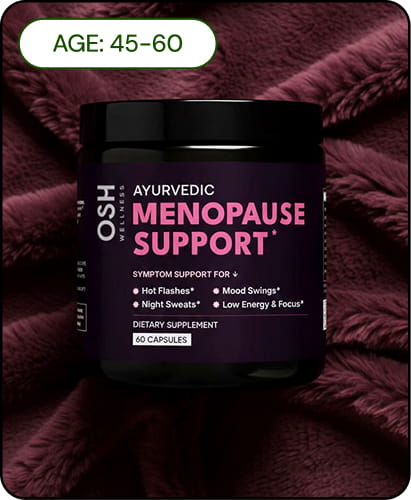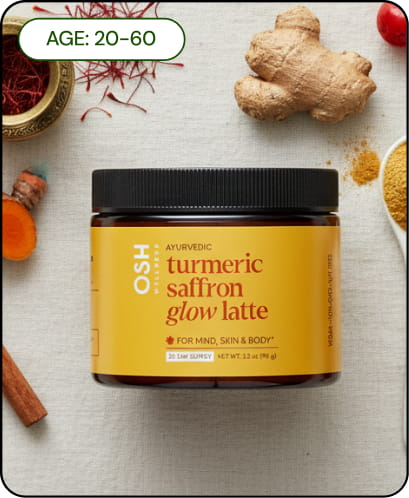Table of contents
Sleep during menopause can be significantly affected, often resulting in disturbances that impact overall well-being. Ayurvedic bedtime rituals offer an effective approach to managing these challenges by addressing imbalances in the Vata dosha, which commonly becomes elevated during this transition. This article explores personalized Ayurvedic practices that promote relaxation, enhance sleep quality, and support holistic health for women navigating this important life stage.
Understanding Sleep Disruption During Menopause

Menopause signifies a major hormonal shift marked by declining estrogen and progesterone levels, both critical in maintaining circadian rhythm and regulating sleep cycles. These hormonal changes often result in trouble falling or staying asleep and are frequently accompanied by mood fluctuations and vasomotor symptoms such as hot flashes and night sweats [1].
Insomnia becomes increasingly common during menopause, exacerbated by heightened anxiety, depression, and other emotional changes [2] . Another contributing factor is Restless Legs Syndrome (RLS), where hormonal fluctuations can affect neurological functions, leading to disruption in sleep due to an irresistible urge to move the legs [3]. Moreover, a reduction in upper airway muscle tone elevates the risk of obstructive sleep apnea, often misdiagnosed as insomnia [4].
Understanding these physiological changes empowers women to pursue effective strategies, including integrative options like Ayurveda, to improve sleep quality during menopause.
Ayurvedic Principles for Sleep Management

In Ayurveda, Nidra (sleep) is one of the traya upastambha (three pillars of life), along with Ahara (diet) and Brahmacharya (regulated lifestyle). Vata dosha, composed of air and ether elements, governs movement in the body and tends to become aggravated during menopause, leading to light, disrupted, and restless sleep.
Ayurvedic guidelines recommend aligning sleep with the Kapha phase of 6–10 p.m., a time naturally supportive of winding down. Women should aim to sleep before 10 p.m. and wake before 6 a.m. to reinforce balance and avoid aggravating Pitta and Vata imbalances [5].
Key strategies to promote better sleep:
Engage in calming evening activities like gentle yoga, meditation, or sipping warm herbal teas.
Take a warm bath or practice Abhyanga (oil massage) using sesame or Brahmi oil.
Eat a light, warm dinner by 7 p.m. and avoid late-night snacking
Create a sleep environment that is warm, quiet, and free from stimulation [6]
By incorporating these Ayurvedic strategies, women can support Vata balance and advance restful, restorative sleep [7].
Dietary Modifications for Better Sleep

Diet plays a pivotal role in minimizing menopausal sleep disturbances. Whole foods, especially fruits, vegetables, whole grains, healthy fats, and lean proteins are important for maintaining hormonal equilibrium. Critical nutrients like omega-3 fatty acids, calcium, and vitamin D promote emotional balance and bone strength [8].
To enhance sleep quality, it’s essential to:
Consume lighter evening meals, rich in easily digestible foods.
Avoid heavy, spicy, or caffeinated items, which may trigger night sweats or anxiety [9]
Maintain consistent meal timings to regulate metabolism and digestion
Herbs such as ashwagandha and jatamansi are renowned for their adaptogenic and calming effects. Clinical studies show that ashwagandha may significantly improve insomnia and stress levels in postmenopausal women [10].
Herbal Remedies and Natural Solutions

Several potent Ayurvedic herbs can help relieve sleep issues tied to menopause. These include:
Ashwagandha (Withania somnifera): A powerful adaptogen shown to improve sleep and reduce anxiety when taken at 600 mg daily for 8 weeks [11]
Shankhpushpi (Convolvulus pluricaulis): Rich in calming effects for the nervous system, available in syrup or powder form
Indian Valerian (Tagara): Known for its sedative properties, helping to reduce sleep latency [12]
These remedies may be consumed as capsules, powders, or in warm milk preparations. It’s advisable to consult an Ayurvedic practitioner, especially when using potent herbs like Indian valerian or Sarpagandha, to avoid potential interactions with medications [13] .
Creating the Optimal Sleep Environment

Building the right ambiance is essential for deep, rejuvenating rest, particularly for menopausal women. Ayurveda emphasizes maintaining a consistent sleep-wake cycle and preparing for rest starting well before bedtime [5].
Foundational elements of a sleep-friendly space include:
Darkness: Promotes melatonin production; minimize exposure to artificial lighting, including screens [6]
Silence: Reduces nervous system overload, essential for calming Vata [14]
Aromatherapy: Scents like lavender and sandalwood ease mental tension and support sleep [15]
Integrating Ayurvedic practices such as self-oil massage, gentle yoga, or sipping herbal teas before bed helps signal the body to transition from activity to rest. Avoiding late-night meals further optimizes digestion and sleep readiness [16].
Mindfulness and Stress Reduction Techniques

Mindfulness-based stress reduction techniques can significantly ease sleep disturbances and mood swings triggered by menopause. Research supports mindfulness as a remedy for reducing anxiety, depression, and irritability, all of which contribute to poor sleep [17].
Highly effective techniques include:
Guided meditation: Proven to improve sleep quality within 8 weeks [18]
Breathwork: Slow, conscious breathing stabilizes the autonomic nervous system [19]
Gentle yoga: Combines movement and mindfulness, promoting both mental tranquility and physical relaxation [20]
Even short, daily mindfulness routines can deliver profound improvements in mental clarity and sleep depth, helping women navigate menopause more smoothly.
Relevant Products
There is a growing selection of commercial menopause-support supplements leveraging these herbs. One example is Osh Wellness Menopause Support, which combines black cohosh, ashwagandha, and shatavari in clinically-informed dosages. Such products offer a convenient solution for those seeking natural relief from menopausal symptoms.
Conclusions

Integrating Ayurvedic bedtime rituals offers a powerful and natural approach to managing sleep challenges during menopause. Women can reclaim restorative sleep and enhance their overall well-being through dietary changes, calming routines, herbal support, and mindfulness. This holistic framework empowers women to make intentional, health-promoting decisions during this life stage.
FAQs
What are Ayurvedic bedtime rituals?
These are calming practices like oil massage, relaxation techniques, and herbal intake that prepare the body for restful sleep.
How do I incorporate these rituals into my routine?
Start with small steps like setting a consistent sleep time, drinking herbal teas, and practicing gentle yoga.
Are there any side effects to herbal remedies?
Consult an Ayurvedic practitioner, especially when using potent herbs, to avoid possible medication interactions.
How long does it take to see improvements in sleep quality?
Improvements may be noted within 4–8 weeks of consistent practice.
Can Ayurveda help with other menopause symptoms besides sleep?
Yes. Ayurveda supports hormonal balance, mood stabilization, and digestive health during menopause.
Sources
1: Johns Hopkins Medicine - How Does Menopause Affect My Sleep?
2: National Institute on Aging - Sleep Problems and Menopause
3: Women's Health Concern - Menopause and Insomnia
4: Menopause Society - Sleep Disturbance and the Menopause
5: Asha Experience - Four Stages of Sleep in Ayurveda
6: Banyan Botanicals - Ayurvedic Guide to Balanced Sleep
7: Vedi Herbals - Ayurveda Sleep for Holistic Health
8: Medical News Today - Ashwagandha for Menopause Symptoms
9: The Better Menopause - Ashwagandha Help with Menopause
10: Menoveda - Ayurvedic Herbs that are a Boon for Menopause
11: The Better Menopause - Herbal Remedies for Sleep Issues
12: Abhinavayu - Ayurvedic Help for Sleeplessness
13: Dr. Sharda Ayurveda - Ease the Menopause with Herbs
14: Lilly Padilla - Ayurvedic Principles for Better Sleep
15: AVCRI - Discovering Sleep with Ayurveda
16: Healthline - Ayurvedic Guide to Sleep
17: Mayo Clinic - Mindfulness and Menopause
18: Frontiers in Public Health - Mindfulness and Sleep Quality
19: Balance Menopause - Does Mindfulness Help?








